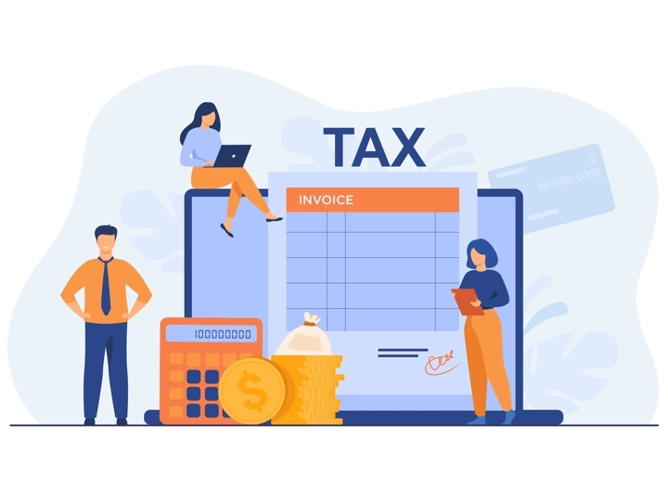
German Tax System Explained – All You Need To Know [2025] -
There are various kinds of German Tax Systems, including Einkommensteuer (income tax), Gewerbesteuer (trade tax), and Umsatzsteuer (value added tax). It is used to finance spending on the common good, like education, social security, healthcare infrastructure, and transport.
In the end, German taxes are based upon the capacity to pay transparently, fairly, and transparently. Significant changes to German fiscal law are anticipated to be driven primarily by international joint initiatives, as well as the adoption of taxation laws that adapt to support new business models, such as digital transformation, distributed ledger technologies, and the promotion of individual tax measures in the context of the environment and digitalization, and EU legal jurisprudence.
German Tax Classes
Tax authorities usually assign employees of German businesses a tax classification based on the various categories. This “Tax Class” is crucial for determining how much taxes withheld (income) tax is deducted from the pay of an employee as well as in assessing the worth of a range of social benefits so that the taxpayer might be qualified. A tax class can assign an employee to a class by authorities according to marital status and other factors. Sometimes, taxpayers may request to be put in one of the classes.
Let’s discuss the tax classes below.
- Class I applies to single (unmarried) individuals who live in an officially registered civil partnership or are divorced, widowed, or married in the absence of the tax class II, III, or IV
- Class II applies to single parents living on their own with one or more children and eligible for the Child allowance or other assistance from the government.
- Class III applies on request to married employees if the spouses live with each other on the same property in Germany with one earning the wage either spouse earns a salary but is categorized in Class V. Also applicable to widowed employees during the calendar year after the death of their spouse who was employed and resided together in Germany on the day that the spouse passed away.
- Class IV is for married couples who live together and have not chosen tax Class III or V for one of them.
- Class V applies to taxpayers whose spouse is classified as Tax Class III.
- Class VI is an optional class available to those who have multiple jobs and earn money from work. Taxpayers may possess several Lohnsteuerkarte results from the numerous positions.
There could be a myriad of family models and variations of tax classes. To ensure that you have the correct classification, you may consider consulting your tax advisor or the office of taxation.
How Does Income Tax Work?
From your gross income, you must pay the government income tax. Any taxes owed will be automatically withheld by your employer from your gross salary and paid to the German tax authority. Any social security contributions will also be taken out by your employer.
What Year Did Income Tax Begin?
Income tax has a long history dating back to Ancient Egypt. The introduction of income tax in Europe began around the 18th century, typically in response to a nation’s need for war funding. The German word for tax is Steuer, which may also be translated as “duty” which makes sense given that people is required to pay taxes to support national public spending.
Different Type of Taxes
Benefits in Kind
It is also possible to pay tax on any item deemed to be a “benefit in kind” – perks or benefits you get through your workplace, like the use of the company vehicle. Taxes on company cars are 1 percent of the vehicle’s list price, which includes VAT. Shares that are given as bonuses or as perks are also tax-exempt.
Solidarity Surcharge
Sometimes referred to as “Soli” for short, the 5.5% tax supplement is due on corporate taxes and capital gains. It was first introduced in 1991 to help pay the expenses of German unification, such as paying for the pensions and debts of the ex-East German government.
In January 2021, it was announced that the “Soli threshold” for income tax had been significantly raised, effectively eliminating the surcharge charged to 90% of taxpayers. Individuals will be assigned if they make annual gross earnings of 61.700 EUR or greater. The Solidarity Surcharge was abolished for most taxpayers starting in 2021.
Church Tax
If you sign up in Germany when you register in Germany, you will be required to declare your religion. If you identify as Protestant, Catholic, or Jewish, you must pay church taxes to the Tax Office collected for religious groups in Germany. It currently stands at 8.8% for Bavaria and Baden-Wurttemberg and 9% in the other federal states. If you don’t have formal religious beliefs, you won’t have to pay the tax on church services.
Consumption Taxes in Germany (VAT)
Consumption tax is a charge on services and goods and may take various forms. The VAT or value-added tax (VAT) is the most commonly used consumption tax for the OECD and the world. Most taxes on consumption don’t tax intermediary business inputs or give an incentive to pay taxes for information, which eliminates tax pyramiding, in which the same item (or service) is taxed several times throughout the production process. The absence of business inputs makes consumption taxes an efficient way to raise taxes.
But, many countries fail to define their tax base accurately. The final consumptive consumption must be taxed at a standard rate to reduce distortions.
Social Insurance
Germany’s well-developed system provides its citizens with financial security, like during illness or unemployment. In Germany, if you earn money that is greater than a specific amount, then you’re required to pay social security. This means you must be part of detailed insurance plans and contribute to them promptly. The following insurances are among them:
-
The law requires healthcare insurance: It pays for doctor’s visits, medications, and therapeutic treatments.
-
Statutory nursing assurance: It provides essential income support in the event of being dependent for a long time for care due to an illness.
-
The Statutory Pension Insurance: It allows employees an income after retirement. The amount is determined by your previous income and the number of years that you spent in Germany.
-
Statutory Insurance for Accidents: It covers the costs of medical treatments and reintegration to work following an accident at work or in the event of occupational sickness.
-
The Law Governing Unemployment Insurance Gives Unemployed People: An amount of money for a set amount of time provided that certain conditions are satisfied. You must be protected for an entire year in the past two years and actively finds a new job.
You pay a set percentage of your income for your social security contribution. Your employer pays an undetermined percentage, too. The cash is delivered directly from your earnings and is paid to a finanzamt (Tax office).
There is no need to transfer any of your contributions. If you are Employed, you’re automatically a part of pension, long-term care, unemployment, and accident insurance plans. There aren’t any private insurance providers other than health insurance.
Wage Tax and Income Tax
If a person has to pay German Tax System, most sources of income are tax-deductible. In Germany, the Lohnsteuer (wage tax) is the sole source for about a third of the German government’s revenue, must be taxed at the start, and is deducted from the compensation. Other income sources (e. for example. self-employment or charges of services, rent collection investment, and so on) are covered by Einkommensteuer (income tax).
Every tax return is subject to an audit. If a tax assessment is made and is not preliminarily issued, the tax assessment can be altered in the future due to the occurrence of exceptional circumstances (e. for instance. tax avoidance).
International Taxes in Germany
In today’s increasingly globalized economy, businesses expand beyond the boundaries of their own countries to reach their customers across the globe. This means that governments must establish rules for how, or even if, the corporate earnings earned in a foreign country are taxed. International tax regulations are the rules and regulations each country applies to businesses.
Tax treaties establish a standard set of tax laws for two countries and aim to decrease the double taxation of individuals, primarily by cutting or eliminating tax withholding between the two countries. Countries with more tax treaty networks offer more appealing tax policies that allow foreign investment and are more competitive than those with fewer treaties.
Tax Returns in Germany
You can submit your German tax declaration by hand or online using BZSt’s software. There are many softwares which can be used for Tax Returns and also they are expat friendly. Anyone filing an income tax return must complete a general tax Form. You may be required to fill out many additional forms according to your particular situation. You can go to Mein Elster (in German) for online filing to submit your application. If you need additional assistance, there are other online explanation documents (in German) to file online.
The primary thing ex-pats have to think about is whether they’re in danger of having to pay double tax – in Germany and their country of origin. Germany has tax agreements bilaterally with various countries, such as Ireland, New Zealand, Australia and Australia, New Zealand, United States, and the United Kingdom.
If you’re seeking expert assistance, you can contact it is possible to get help from a professional. They offer a search function to help you locate the closest tax office in your area that could be able to assist. But, there’s an increasing number of English-speaking websites that are friendly to ex-pats, which can help you prepare tax returns in German for tax purposes.
Tax-Related Advice for Income Tax in Germany
The German Tax System of income for ex-pats could be complicated. It’s essential to ensure you’re up to date with the country’s taxation rules to avoid costly penalties for filing your tax returns incorrectly completed, as well as learn the existence of any tax treaties that currently double in the country.
Websites like the International Federation of Accountants can assist you in finding member organizations. Additionally, you can get expert tax advice from companies that specialize in providing assistance and financial advice for ex-pats, such as Wundertax.
What Are The Benefits Of Working In Germany?
Anyone working in Germany who makes more than €520 a month is automatically enrolled in the country’s social security system. From 1. January 2024, this amount has increased to 538 Euros, which eventually increase the minijob wage.
Expats can participate in the system to a significant extent, and the social payments deducted from your pay may entitle you to advantages like:
Kindergeld
Working in Germany offers you access too many advantages. One such benefit is called ‘ Kindergeld‘. Kinder geld is a childcare benefit provided to the German state to parents working at home in Germany with children. The benefits are also offered when children live abroad in any of the countries within the EU/EEA.
Foreigners who reside in Germany can also apply for kindergeld if they possess a valid residence permit. However, citizens of the EU/EEA don’t require a residence permit to be eligible for benefits.
How do you determine whether you’re a resident of the United States or not to be Tax-Exempt?
In general, you’ll be deemed as a resident of Germany if you own an official residence in Germany or spend more than six per month in Germany (habitual home).
The term “domicile” refers to a home as a residence or property owned or rented out to the taxpayer, who is in complete control on the house. A permanent residence is determined if you are physically in Germany for longer (more than six months).
Also, you’ll be considered non-residents if you’re not spending less than six consecutive days in Germany.
The non-residents (limited taxes on income) can be considered and are taxed like German citizens (unlimited tax obligation) when:
- At least a 90 percent of the global income during a calendar year is tax-free in Germany. German Tax System.
- OR their income earned from outside of Germany in a calendar year that is not more than EUR 9,169. EUR 9,409 for 2020, EUR 9,744 in 2021 and EUR 9, 984 in 2022. This has increased to 10,347€ in 2023 and this will increase to 11,604€ in 2024. The amounts will be reduced if necessary and per the specifics of the taxpayer’s country of residence.
Extended business travelers are likely to be classified as non-residents of Germany to the extent that they are in Germany for more than six months consecutively (brief interruptions like weekends home are not considered). Employment income from Germany is typically regarded as being German-sourced when you provide services physically in Germany.
What Kinds Of Incomes Are Tax-Deductible In Germany?
Dividends, interest, and capital gains from stock can be subjected to a tax rate of 25 percent and a solidarity tax.
Certain types of income are tax-free, but they are used to calculate the tax rate, for example, the benefits for unemployment, maternity pay, and certain tax-free income in other countries because of treaties on double taxation.
The amount you are liable for individual German taxation on income is determined in addition to your residence status. No matter if you’re either a resident or non-resident in taxation, the only thing you’ll be taxed on is the German-sourced income. The income earned worldwide is used to calculate the tax rate you pay.
How Do You Complete Your Tax Return In Germany?
Employed employees don’t need to file a tax return unless they earn income from other sources than their primary source of employment. Taxes on the payroll are taken from employed workers’ pay, meaning employees’ income is taxed automatically. This is also true with social contributions to different kinds of compulsory insurance.
Self-employed people in German Tax System are required to complete a tax return each year. German tax returns for income are due by the close of that year’s tax period, which is the same time as the calendar year. The standard timeframe is July 31, which means you have to submit your 2023 tax return by July 31, 2024 but due to COVID it has been increased to 2nd September.
Six to two months after you have filed your tax return, you will be notified of an assessment of tax by the Tax Office. This document explains the conditions for any refunds – if you are owed money, it is directly into the bank account of your choice. If you have a tax debt, you’ll have an additional four weeks to repay the tax.
How Much Does It Fine To File A Tax Return Late?
If you fail to complete the German Income Tax Return by the due time will be the subject of late filing charges. If your tax return is not filed on time, you’ll be penalized 0.25 percent of your total tax assessed. For example, if your tax liability is EUR10,000, you’ll be evaluated at EUR25 per month in late charges.
If you’re in arrears with paying the tax you owe and are fined one percent of the tax that is not paid every month, you fail to deliver.
How Do You Submit a Tax Declaration Report in Germany?
Utilizing the ELSTER portal, an online registration system managed by the Federal Tax Office. There are also Tax Return online plaforms which are expat friendly and helps you declare taxes in Germany. Both Kontist and GetSorted provide the option to submit the declaration on your behalf without having to visit the tax office or by registering on the ELSTER portal.
Do US Expats Pay Taxes in Germany?
US ex-pats have to file taxes in Germany if they earn income in Germany. Additionally, US citizens must file tax returns in Germany and the US regardless of where they live or net income. The US is the only country to tax its citizens twice (Eritrea as the other).
Do Muslims Also Pay Church Tax?
Only religious communities that a federal government recognizes as a public sector organization can charge Church Tax. The general rule applies to certain Muslim community groups within Germany However; they do not have to collect any tax from their members. Some Muslim groups do not enjoy the statutory status of a public entity and thus aren’t allowed to collect taxes. Muslims are not required to pay a Church Tax within Germany.
What is the Corporation Tax?
The Corporation German Tax System becomes relevant if you start a business and choose “corporation” as the legal form. Corporations – for instance, stock corporations or Limited Liability Companies (GmbH)- are legal entities and do not pay income tax but corporation tax. This depends on the type of the business in Germany
Simply put, the word “corporation” means that the tax is the tax on income (“Einkommensteuer”) that legal organizations pay. The tariff for corporations is calculated based on the amount of revenue that the business in its legal form earned during the calendar year. Learn about Corporation Tax in our chapter on establishing a registered company.
What tax do we pay on our payroll ?
Payroll tax (“Lohnsteuer”) is one of the forms of taxation on income. You have to pay the tax on your wages if you’re employed. Payroll tax is a distinct collection method by removing it automatically from your employer’s pay and transferring it to the relevant Tax Office.
The process is where your tax exemptions and your marital status are immediately considered when assigning your tax bracket. If you’re married, single, divorce, widowed, or a parent with a single child, various tax rates apply to you. The details are in our section “Tax Declaration.”
Does Germans like to pay their taxes?
As an UN-backed study has revealed, the citizens of Germany consider their citizens are more willing to pay taxes on public expenditure than citizens from other nations.
Are Taxes Excessive in Germany?
Tax on income in Germany is progressive in Germany. The rates start at 14% before gradually climbing to 42 percent. A maximum percentage of 45 percent is offered to those with good earnings.
What Tax Amount Do You Have To Pay in Germany?
The German Tax System income in Germany has a progressive rate, beginning at 1 percent and gradually increasing to 42%, or for wealthy individuals, up to 45%. Tax rates of 42% are applied to income taxable from EUR 66,761 to 277,825 by 2024.
Do Foreigners Pay Taxes in Germany
Anyone living, working, and making a profit in Germany must pay taxes both at the local and federal levels. It is common to be tax-paying if you choose to reside in Germany for longer than six months and then register your new address with Germany.
What is the average salary in Germany?
Decent annual pay for Germany can be found between EUR 64, 000-EUR 81, 000. The gross amount (salary without social contributions or taxes) is contingent on your job, industry, and education.
What is the considered as a Good Salary in Germany?
As per the Federal Statistical Office of Germany, in 2024, the average gross annual income was 50.088 Euros which is 4.174 Euros per month.

Jibran Shahid
Hi, I am Jibran, your fellow expat living in Germany since 2014. With over 10 years of personal and professional experience navigating life as a foreigner, I am dedicated to providing well-researched and practical guides to help you settle and thrive in Germany. Whether you are looking for advice on bureaucracy, accommodation, jobs, or cultural integration, I have got you covered with tips and insights tailored specifically for expats. Join me on my journey as I share valuable information to make your life in Germany easier and more enjoyable.





